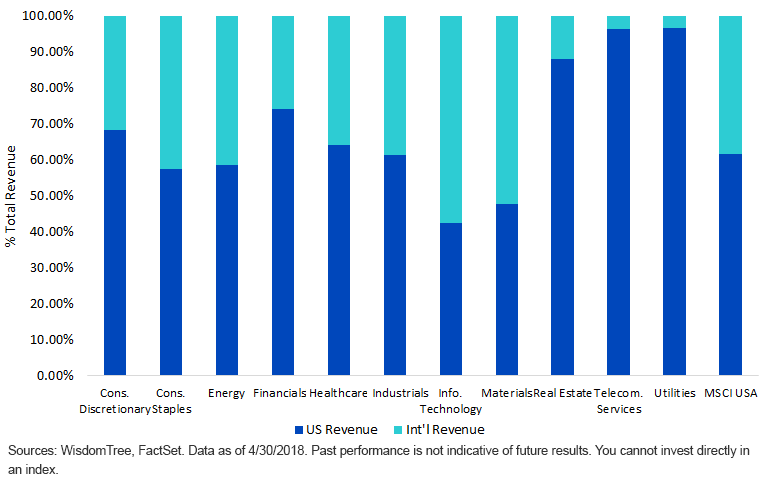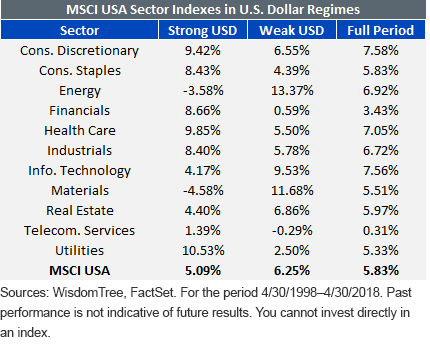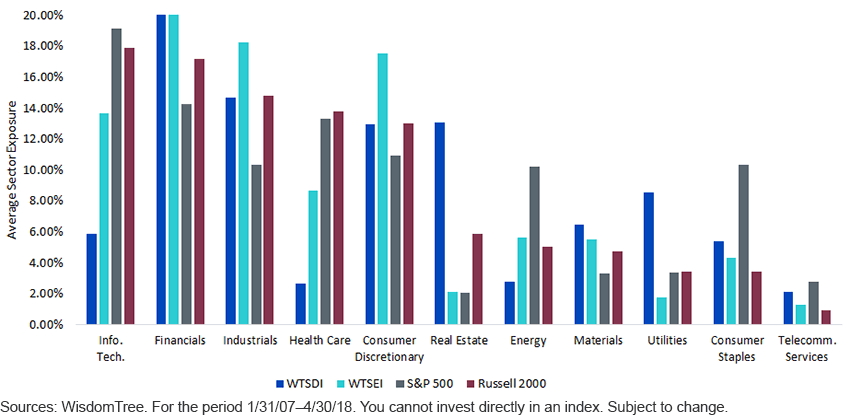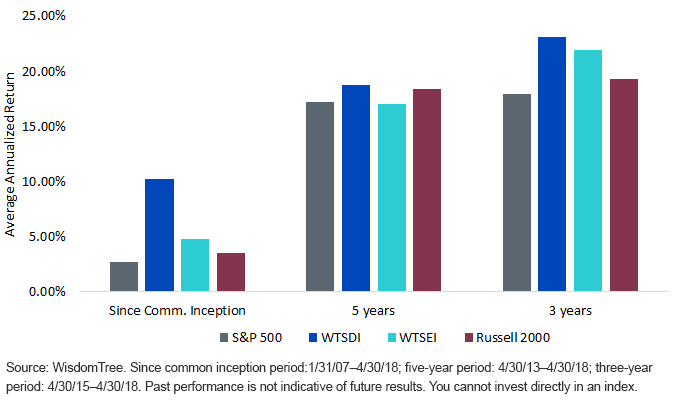WisdomTree launched its first ETFs in June of 2006, pioneering the concept of fundamental weighting. WisdomTree sponsors distinct ETFs that span asset classes and countries around the world.
How a Strengthening U.S. Dollar Affects Equity Returns
Movement in the U.S. dollar can be a headwind or a tailwind for earnings of U.S.-based companies. A company’s sensitivity depends proportionately on how much business it conducts internationally. In the chart below, we can see that, aggregately, firms in sectors such as Information Technology and Materials generate more than 50% of their revenue internationally and are therefore more sensitive to currency movements. On the other hand, companies in the Telecommunication Services and Utilities sectors, which are heavily exposed to the domestic market, tend to be relatively immune.
MSCI USA Sector Indexes: Current Geographic Revenue
Defining periods of U.S. dollar weakness and strength using trends in the moving averages for the ICE U.S. Dollar Index (DXY) 1 allows us to see how sectors have behaved during the different regimes. The table below shows how different sectors within the MSCI USA Index performed over the past 20 years. We can see how domestically focused sectors outperformed the broad MSCI USA Index during periods of U.S. dollar strength, while more exporting-focused sectors beat when the dollar weakened. We can also see how sectors with a domestic focus have been less sensitive to movement in the currency, and therefore their returns show a smaller dispersion from one regime to another (such is the case for Real Estate and Utilities). On the other side, returns of exporter-focused sectors such as Materials and Energy show a larger deviation when the dollar moves.
In today’s economy, large-cap companies tend to be among the most globalized, conducting business activities in almost every country in the world, while small-cap companies focus on their domestic market. Evidence of this is that, on average, the large-cap-focused S&P 500 Index gets 61% of its revenue from the U.S., while the small-cap-focused Russell 2000 Index derives 79% of its revenue from domestic business. This domestic focus is also reflected in the different sector composition small-cap indexes have compared with their large-cap counterparts because they tend be over-weight in the more domestic sectors.
The WisdomTree U.S. SmallCap Dividend Index (WTSDI) , which weighs dividend-paying small-cap companies according to their aggregate share of indicated dividends to be paid, and the WisdomTree U.S. SmallCap Earnings Index (WTSEI) , which weighs profitable small-cap firms by their proportionate share of total aggregate earnings, magnify these tilts deviating from traditional market-cap weighting . The table below shows the difference in average sector exposures over the past 11 years for WTSDI, WTSEI, S&P 500 and the Russell 2000.
Average Sector Exposure
These sector tilts and domestic focus can help explain performance during different macroeconomic regimes. Below, we focus on how WisdomTree’s U.S. small-cap strategies—WTSDI and WTSEI —have performed when the U.S. dollar strengthens across different time periods.
WisdomTree’s Small-Cap Strategies: Returns When U.S. Dollar Strengthens
Looking at this chart, we can see that during periods of U.S. dollar strength, WTSDI and WTSEI have performed better than the S&P 500 Index and have also had an edge versus the broader small-cap benchmark, the Russell 2000 Index.
The last time the market experienced a strengthening U.S. dollar was from the middle of 2014 through the end of 2016, with DXY appreciating 10.12% annually. During this period, the WisdomTree SmallCap Dividend and Earnings Indexes outperformed the S&P 500 Index, which rose 7.70% on an annual basis, by 264 and 51 basis points (bps) , respectively. WTSDI and WTSEI also outperformed the Russell 2000 Index by 356 and 143 bps annually, respectively. 2
After depreciating in 2017, the dollar recently has reversed this trend and rallied more than 5% 3 since February. If the dollar is to continue strengthening, investors with an income objective may want to consider exposure to the WisdomTree U.S. SmallCap Dividend Fund (DES) , which tracks our domestically focused and defensively positioned WTSDI. Investors who are looking for a larger exposure to cyclical sectors in a rising interest rate environment may want to consider adding the WisdomTree U.S. SmallCap Earnings Fund (EES) , which tracks WTSEI, to the equity portion of their portfolio.
1 Defining strengthening and weakening months for the dollar using trends in the 50-day simple moving average for DXY and confirming the classification by looking at trends in the 50-day and 100-day centered moving averages.
2
Source: Bloomberg. Data as of 5/21/2018.
3
Source: Bloomberg. Data as of 5/21/2018.
RSS Import: Original Source
Investors should carefully consider the investment objectives, risks, charges and expenses of the Funds before investing. U.S. investors only: To obtain a prospectus containing this and other important information, please call 866.909.WISE (9473), or click here to view or download a prospectus online. Read the prospectus carefully before you invest. There are risks involved with investing, including the possible loss of principal. Past performance does not guarantee future results.
You cannot invest directly in an index.
Foreign investing involves currency, political and economic risk. Funds focusing on a single country, sector and/or funds that emphasize investments in smaller companies may experience greater price volatility. Investments in emerging markets, real estate, currency, fixed income and alternative investments include additional risks. Due to the investment strategy of certain Funds, they may make higher capital gain distributions than other ETFs. Please see prospectus for discussion of risks.
WisdomTree Funds are distributed by Foreside Fund Services, LLC, in the U.S. only.





